Iran Slams Support Of French President For Opposition
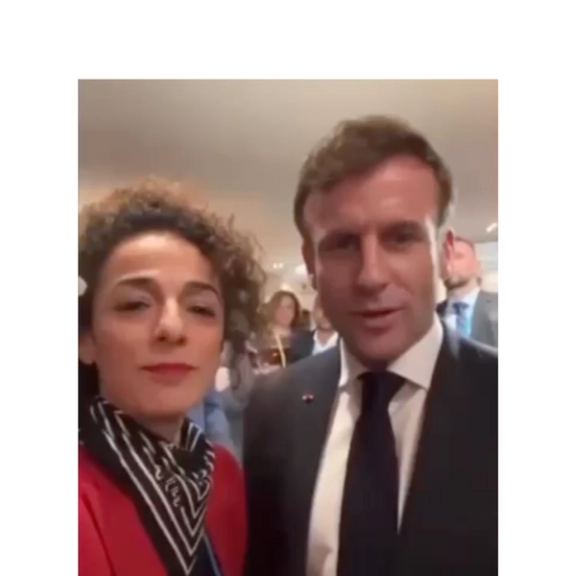
The Islamic Republic has lashed out at French President Emmanuel Macron for his meeting with famous US-based Iranian activist Masih Alinejad.

The Islamic Republic has lashed out at French President Emmanuel Macron for his meeting with famous US-based Iranian activist Masih Alinejad.
Foreign Ministry Spokesman Nasser Kanaani said in a tweet Saturday that “those who ignore 44 years of overwhelming support of majority of Iranians in for the country [Islamic Republic], and go to a few anonymous clowns, neither believe in democracy nor know the revolution and the Iranian nation.”
He further made a threat saying, “Soon you will kneel before the perseverance, strength and greatness of the Iranian nation.”
On the sidelines of the Munich Conference on Friday, Emmanuel Macron had a friendly encounter with women’s rights activist Alinejad, one of eight dissident figures who have formed a coalition to support the protests in Iran.
During the short conversation, a video of which was published in Alinejad’s twitter account, Macron said that “I want to congratulate you and all the members of the coalition for joining and teaming up nicely...”
The French president praised a united front among eight leading Iranian opposition figures formed earlier in February, promising to meet with the group.
Three members of the group, Prince Reza Pahlavi, Masih Alinejad and Nazanin Boniadi are participating in the Munich Security Conference, while Iranian officials have not been invited.
The dissident leaders have been participating in events around the world to make the voice of the Iranian opposition heard. Such events signal the emergence of a leadership council in the diaspora to campaign for international support in favor of Iran’s protest movement.
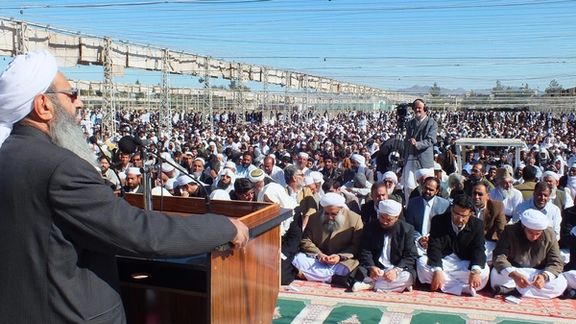
Iran's most prominent Sunni leader Mowlana Abdolhamid has once again called for a referendum in the country, saying people's wish for a secular government must be met.
During his Friday prayer sermon, the outspoken Sunni leader continued to challenge the Islamic Republic and its ruler Ali Khamenei by demanding submission to the popular will, saying that an Islamic government must be democratic according to practices in the early years of Islam.
Pointing to the ongoing disagreement between a large part of the nation and the regime, he said the reasonable way out of this political impasse that would cause the least harm is the submission of the Islamic Republic to rule and the will of the people.
"The Islamic Republic regime was established in Iran 44 years ago and since the 1979 revolution, a particular reading and understanding of Islam has been prevalent in the country and it has been the same until now. But there is another understanding of Islam that we believe in, and that is the justice of Imam Ali,” referring to the fourth Caliph and the first Shiite Imam. “In this view, there is not only one ruler and a permanent government; the ruler should be determined by the people,” he added.
He added, "There is no death sentence in this reading of Islam. Forced confession is rejected and has no place. In this view, people can easily criticize their ruler and government. There is freedom.”
Women should enjoy equal rights as men, so do all ethnic groups, religions, and all human beings, Abdolhamid noted, adding that “The only solution to end the differences is accepting the will of the majority of the people.”
Elsewhere in his remarks, he criticized the regime’s plan to liquidate public assets and grant immunity to the seven-man team responsible for its implementation. Such properties belong to all the people, he underlined, adding that the "Iranian people have a bitter memory of privatization.” Previously, under the guise of privatization, public properties, factories and big companies were sold far below market price to people or organizations with connections and influence, he said.
Moreover, he once again demanded the release of "imprisoned religious leaders of various provinces, especially in provinces of Kordestan and Sistan-Baluchistan" as well as other political and ideological prisoners.
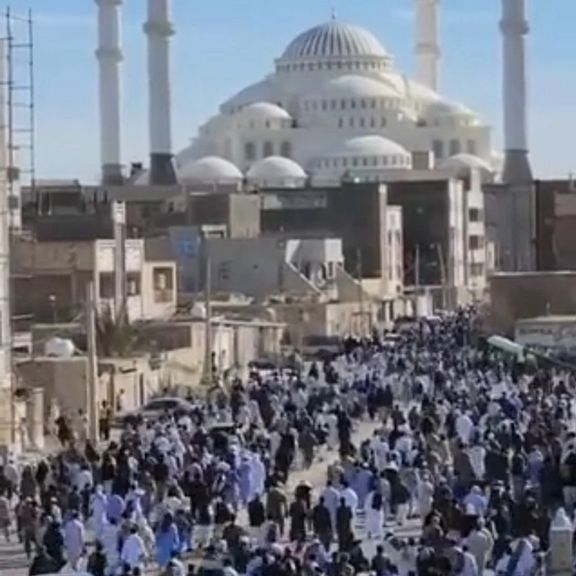
As is the new normal in Zahedan, where Abdolhamid leads the Friday prayers, people held demonstrations after they left the mosques on Friday and chanted slogans against the Islamic Republic and its ruler Ali Khamenei. Similar rallies were held in another city of the province, Khash.
However, over 1,300 kilometers north of Zahedan, in Golestan province where there are large Sunni Baluch and Turkmen communities, another Sunni Mowlavi (Imam), Mohammad-Hossein Gorgij, has reportedly been put under house arrest. People held a gathering outside the residence of Gorgij and expressed their support for him.
Also on Friday, the security situation was tense in several Kurdish cities, which are predominantly populated by Sunni people, such as Sanandaj in Kordestan province and Sardasht in West Azarbaijan. People were not allowed to visit their cities’ graveyards as the security forces are afraid that any gathering can morph into antigovernment protest rallies.
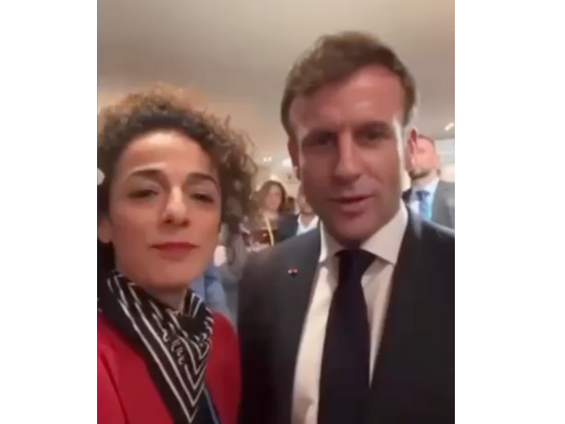
The French president has praised a united front among eight leading Iranian opposition figures formed earlier in February, promising to meet with the united group.
Three members of the group, Prince Reza Pahlavi, Masih Alinejad and Nazanin Boniadi are participating in the Munich Security Conference, while Iranian officials have not been invited.
On the sidelines of the conference Emmanuel Macron had a friendly encounter with women’s rights activist Masih Alinejad, one of the eight dissident figures.
During the short conversation, a video of which was published in Alinejad’s twitter account, Macron said that “I want to congratulate you and all the members of the coalition for joining and teaming up nicely to support.”
“To us and the civil society, what's happening in Iran is very important. And I'd be very happy to meet all of you, altogether because this message of unity is important,” he added.
Alinejad told Macron that leaders of leading countries are calling the current wave of antigovernment protests across Iran “a revolution,” adding that “France is all about revolution, and you're going to be the voice of Iranian women.”
Also on the sidelines of the first day of the Munich Security Conference, Prince Reza Pahlavi told reporters that “I think when you have a true democratic system, every demand or expectations that people living in that country will have would have to be addressed by the rule of law and guarantee of freedom and equality, and no discrimination of any form.”
He added, “I hope our Constitution in the future will be based on the Universal Declaration of Human Rights which by default would immediately address so many expectations and of course many more that we could address based on our alliance and work today on a Charter and hopefully build that into the equation in the future.”
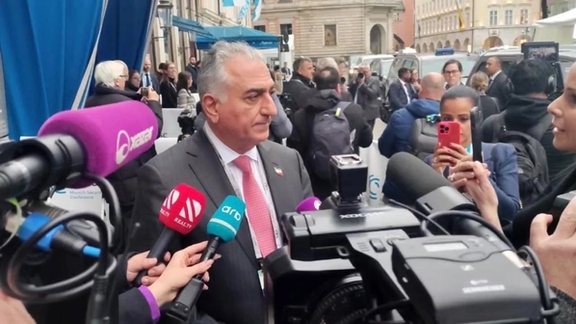
The organizers of the annual forum, which draws together senior foreign and defense officials, have not invited the Iranian government to this year’s event, citing “the current political situation” in the country. Many Iranians residing in the city also held a gathering outside the venue of the event on Friday supporting the three leading figures at the conference. Protesters in Iran and opponents abroad see the decision to invite dissident leaders as a big victory for the protest movement that began in September after Mahsa Amini was killed in ‘hijab police’ custody.
During the three-day event, a panel will be held on Saturday titled “Woman, Life, Freedom: Visions for Iran,” in which Alinejad, Pahlavi and actress and activist Boniadi will participate. US Senator Robert Menendez, the Chairman of the Senate Committee on Foreign Relations and Member of European Parliament Hannah Neumann are also among the panel. Suzanne Maloney from The Brookings Institution and Karim Sadjadpour from the Carnegie Endowment for International Peace will be the moderators of the event.
Since a historic forum in Washington was held earlier this month with four of the eight opposition figures in attendance, and four others sending video messages, the dissident activists have been participating in events around the world to make the voice of the Iranian opposition heard. Such events signal the emergence of a leadership council in the diaspora to campaign for international support in favor of Iran’s protest movement.
Alinejad and Canada-based activist Hamed Esmaeilion, whose daughter and wife were killed in the shooting down of Flight PS752 downed by Iran’s Revolutionary Guard in 2020, are also scheduled to deliver speeches at the Italian Senate about the current wave of the protests in Iran. They are also set to attend a gathering against the Islamic Republic in the capital Rome the following day.
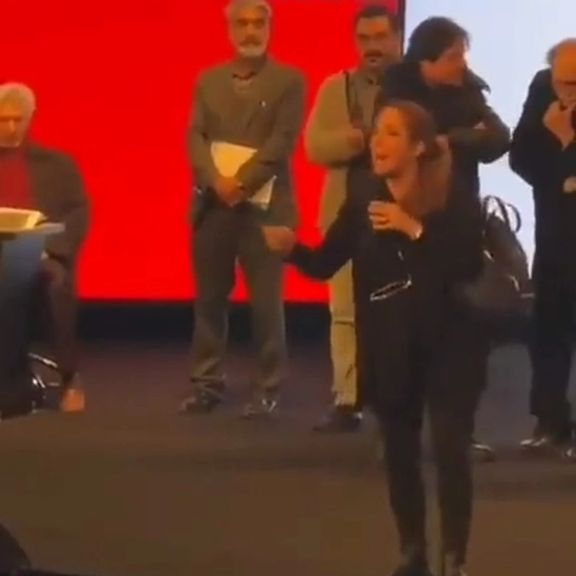
Video of a woman in Iran who threw away her veil after being banned from becoming a candidate because of her improper hijab, has gone viral.
Zeynab Kazempour removed her headscarf on Friday during the annual assembly of Tehran Construction Engineering Organization after the board of directors did not allow her to run as a candidate for the board.
She then made a short statement on the stage, saying that "I don't recognize the assembly that doesn't allow candidates to run because they don't wear a headscarf." The participants of the meeting were applauding her as she threw away her scarf before leaving the stage.
Sharing the video on social media, some users have emphasized that conditions in the country will not never return to the period before before the nationwide uprising and the government cannot force the hijab on women anymore.
Since the current wave of protests ignited across Iran following the death in custody of Mahsa Amini, many Iranian women took off their headscarves in public and even set fire to some headscarves as a sign of opposition to the mandatory hijab.
Earlier in the week, some members of the National Library of Iran protested the suspension of several female members for not complying with the "mandatory hijab".
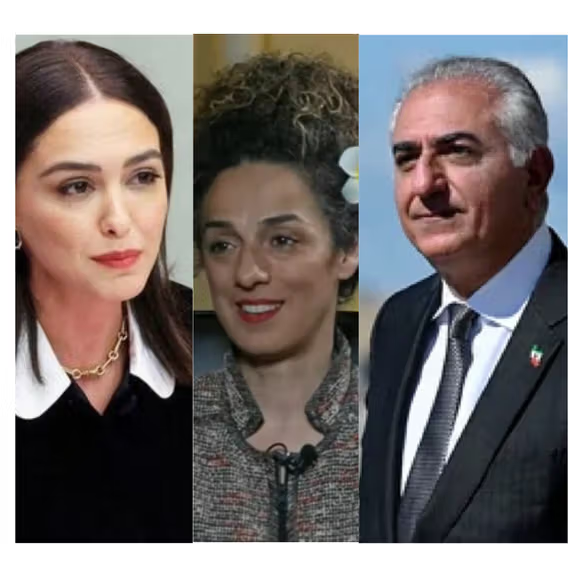
Prominent Iranian dissident figures, exiled prince Reza Pahlavi, women rights activist Masih Alinejad, and activist Nazanin Boniadi are attending the Munich Security Conference.
The conference, which has not invited officials from Russia and the Islamic Republic of Iran this year, starts Friday and concludes February 19. Many Iranians residing in the city also held a gathering outside the venue of the event on Friday to support the dissident figures.
The organizers of the annual forum, which draws together senior foreign and defense officials, have not invited the Iranian government to this year’s event, citing “the current political situation” in the country.
Protesters in Iran and opponents abroad see the decision to invite dissident leaders as a big victory for the protest movement that began in September after Mahsa Amini was killed in ‘hijab police’ custody.
Since a historic forum in Washington was held with eight prominent opposition figures in attendance, the dissident activists have been participating in events around the world to make the voice of the Iranian opposition heard. Such events signal the emergence of a leadership council in the diaspora to campaign for international support in favor of Iran’s protest movement.
Alinejad and Canada-based activist Hamed Esmaeilion, whose daughter and wife were killed in the shooting down of Flight PS752 downed by Iran’s Revolutionary Guard in 2020, are also scheduled to deliver speeches at the Italian Senate about the current wave of the protests in Iran. They are also set to attend a gathering against the Islamic Republic in the capital Rome the following day.
In December, the Italian Senate’s Foreign Affairs and Defense Committee unanimously approved a resolution urging Tehran to respect women’s rights and stop its crackdown on peaceful protesters.
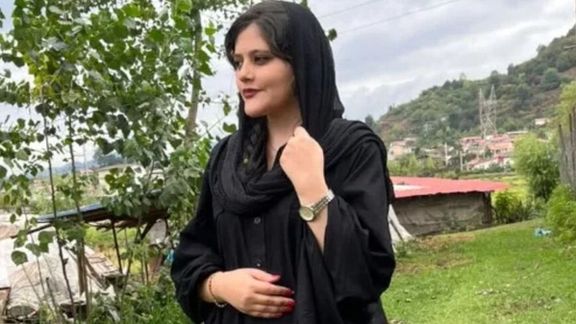
The protest movement in Iran has succeeded in sowing the seeds of a hitherto missing dialogue among social groups and generations that can rekindle the protests anytime.
The protest movement born after the death in custody of Mahsa Amini in September has to a good degree succeeded in creating a process of dialogue between the modern and traditional groups of the society and between generations, professor Hadi Khaniki, chairman of the Iranian Society of Cultural and Communications Studies of Tehran University, said in a speech at Rahman Institute in Tehran last week.
The regime which heavy-handedly suppressed protesters, executed four, killed as many as 500 and arrested around 20,000 in the first four months is now claiming victory but the impact of the protests has been immense.
The relative recent calm may have only been temporary, too. On Thursday, people took to the streets in several cities again on day forty after the execution of two protesters, Mohammad Hosseini and Mohammad-Mehdi Karami, in Karaj. Protests have been reported from the capital Tehran, Mashhad, Sanandaj, Karaj, Izeh.
In an essay from Evin Prison in Tehran which was published by Zeytoon website on January 31, prominent sociologist Saeed Madani said one would not be able to imagine any future for Iran that does not bear the mark of the Mahsa Movement.
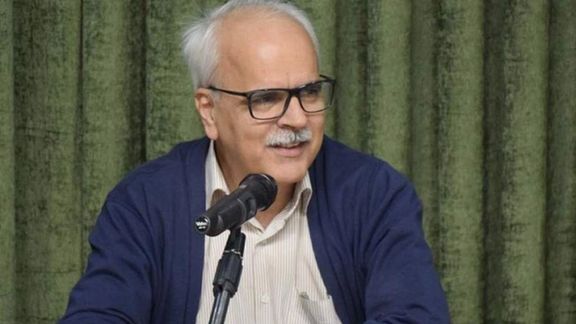
“Understanding what happened in over 100 days of protests bears strategic significance even if at the time of publication of this essay the protests have temporarily or permanently ended,” Madani wrote.
“The protest movement has [also] created…a multi-dimensional national identity with various ethnic, gender and religious identities somehow acting together instead of one-dimensional nationalism,” Khaniniki said while pointing out that the protests have also established a process of communication between expatriates and the people of Iran “despite all [their] political differences”.
Khaniki who has dubbed the recent protests as the “Movement of the Neglected”
was a member of the central council of the reformist Mosharekat (Islamic Iranian Participation Front) Party which formed the largest faction in the parliament from 2000 to 2004 during the presidency of Mohammad Khatami to whom he served as a media advisor.
Mosharekat Party was banned in 2009 in the aftermath of the disputed elections that brought the hardliner Mahmoud Ahmadinejad to power for a second term, and many of its leading figures were imprisoned. The party did not declare itself secular but did promote the separation of religion and state. Khaniki is currently a member of the central council of the Etehad-e Mellat (National Unity) Party which has many similarities to Mosharekat.
The Mahsa Movement has also somehow reactivated Iran's once very popular reformists who were marginalized after 2009. Two weeks ago, two of their prominent leaders, Khatami and Mir-Hossein Mousavi who has been under house arrest since 2011, issued separate statements related to the protest movement.
Khatami condemned the regime suppression of the protests but insisted that the solution to the problems of the country is not overthrowing the regime which he said was impossible to do because of its power of suppression. Instead, he advised the regime to surrender to fundamental reforms before it is too late.
Mousavi, on the other hand, announced his recognition of the Woman, Life, Freedom movement and declared that the Islamic Republic was no longer reformable. The current regime must be replaced, through elections and referendum, with a new democratic government through non-violent means, he said.
Both statements have found resonance with various political figures and parties from across the reformist spectrum.